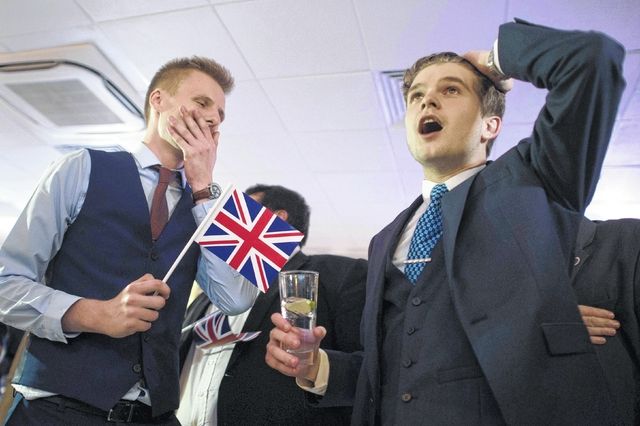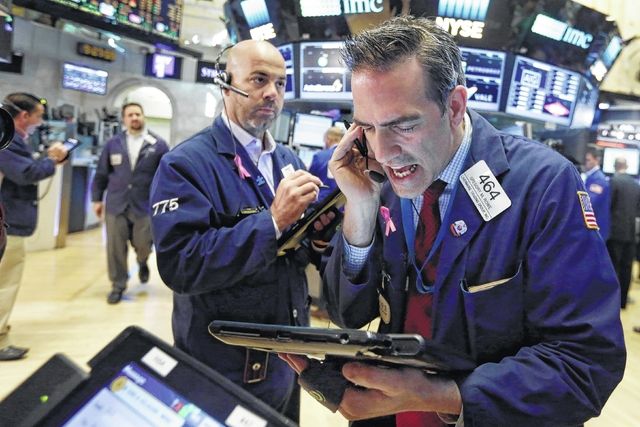Click here to subscribe today or Login.
LONDON — The U.K.’s unprecedented decision to leave the European Union sent shockwaves through the country and around the world Friday, rocking financial markets, toppling Prime Minister David Cameron and even threatening the ties that bind the United Kingdom.
“Leave” campaigners hailed the result as a victory for British democracy against the bureaucratic behemoth of the EU. For the 48 percent of British voters who wanted to remain — and for the 2 million EU nationals who live and work in Britain, but could not vote — there was “mix of shock, anger and depression,” according to a Wilkes University professor who was in London for the vote.
In an email to the Times Leader Friday evening, Jonathan Kuiken, an assistant professor of history and an expert on modern British history, said the impact of the vote extended to the city’s daily commute.
“I actually left London this morning, but on my way to the airport I actually saw, for the first time in my life, Londoners speaking with each other on the Tube,” Kuiken said, referring to the London Underground rapid transit system. “People on the Tube never even make eye contact with one another, never mind speak to one another!”
In a referendum marked by notably high turnout — 72 percent of the more than 46 million registered voters — “leave” won with 52 percent of the votes.
The decision launches a yearslong process to renegotiate trade, business and political links between the U.K. and what will become a 27-nation bloc, an unprecedented divorce that could take a decade or more to complete.
Cameron, who had led the campaign to keep Britain in the EU, said he would resign by October and left it to his successor to decide when to invoke Article 50, which triggers a departure from European Union.
Kuiken described Cameron’s push to hold the referendum, a move intended to quiet a rebellious wing of the country’s Conservative Party, as a tremendous miscalculation in a “purely internal political maneuver that snowballed beyond nearly everyone’s expectations.”
Stock markets plummeted around the world, with key indexes dropping more than 12 percent in Germany and about 8 percent in Japan and Britain. Markets calmed and later recovered some of their losses after Bank of England Governor Mark Carney promised to take “all the necessary steps to prepare for today’s events.”
The Dow Jones industrial average dropped 611 points, or 3.4 percent, its biggest fall since August.
The euro fell against the dollar and the pound dropped to its lowest level since 1985, plunging more than 10 percent from about $1.50 to $1.35 before a slight recovery, on concerns that severing ties with the single market will hurt the U.K. economy and undermine London’s position as a global financial center.
Kuiken said the city’s financial industry will likely recover from the blow.
“This won’t last too long but it will wipe out a lot of wealth in the mean time,” Kuiken said. “London will always be a major financial sector and depending on who becomes the new prime minister, it might see the type of financial deregulation that will make it an attractive magnet for the types of large financial transactions that were typical of the early 2000s.”
The referendum result revealed Britain to be a sharply divided nation: Strong pro-EU votes in the economic and cultural powerhouse of London and semi-autonomous Scotland were countered by sweeping anti-establishment sentiment for an exit across the rest of England, from southern seaside towns to rust-belt former industrial powerhouses in the north.
“Ironically, it was the old industrial areas of Britain that heavily supported ‘Brexit’ but I think they will be the areas most adversely effected,” Kuiken said.
For many who voted “leave,” the act was a rebellion against the political, economic and social establishment and the derided “experts” — including CEOs, artists, scientists and soldiers — who had written open letters warning of the consequences of an EU exit.
Pro-Brexit voters were persuaded by the argument that leaving the EU meant taking back control of immigration — by abandoning the bloc’s principle of free movement among member states — and reclaiming billions that the U.K. pays to Brussels each year.
“Remain” supporters said this was a fantasy of sovereignty in an interconnected world, one that ignored the benefits the EU, and EU workers, bring to Britain.
But for many “leave” voters — who tended to be older, less well-educated and less well-off than the other side — the vote was reclaiming a birthright.
“Many people in Britain had valid arguments for supporting Brexit but underlying many of them was a sense that the elites of the right, left and center have ignored the concerns and demands of the people for too long,” Kuiken said. “This is a legitimate concern and one that has the potential to go in ugly directions.”
Populist politicians, including France’s Marine Le Pen and the Netherlands’ Geert Wilders, hailed the result and called for similar anti-EU votes in their countries.
Donald Trump praised the decision during a visit to one of his golf courses in Scotland, saying Britons “took back their country.” He compared the vote to the U.S. sentiment that has propelled him to presumptive Republican presidential nominee, saying “people are angry all over the world.”
President Barack Obama said he talked to Cameron and believes the British voters’ decision speaks “to the ongoing changes and challenges that are raised by globalization.”
“This may go nowhere, but one sees a distinct trend throughout Europe of politics moving away from the goals of the European Union — cooperation, integration, trade — and towards the autarkic and nationalist policies of an earlier age,” Kuiken said.
The Wilkes professor said he is heading to Brussels, the capital of the EU next week.
“It will be interesting to see reactions on the other side as well,” he said.






